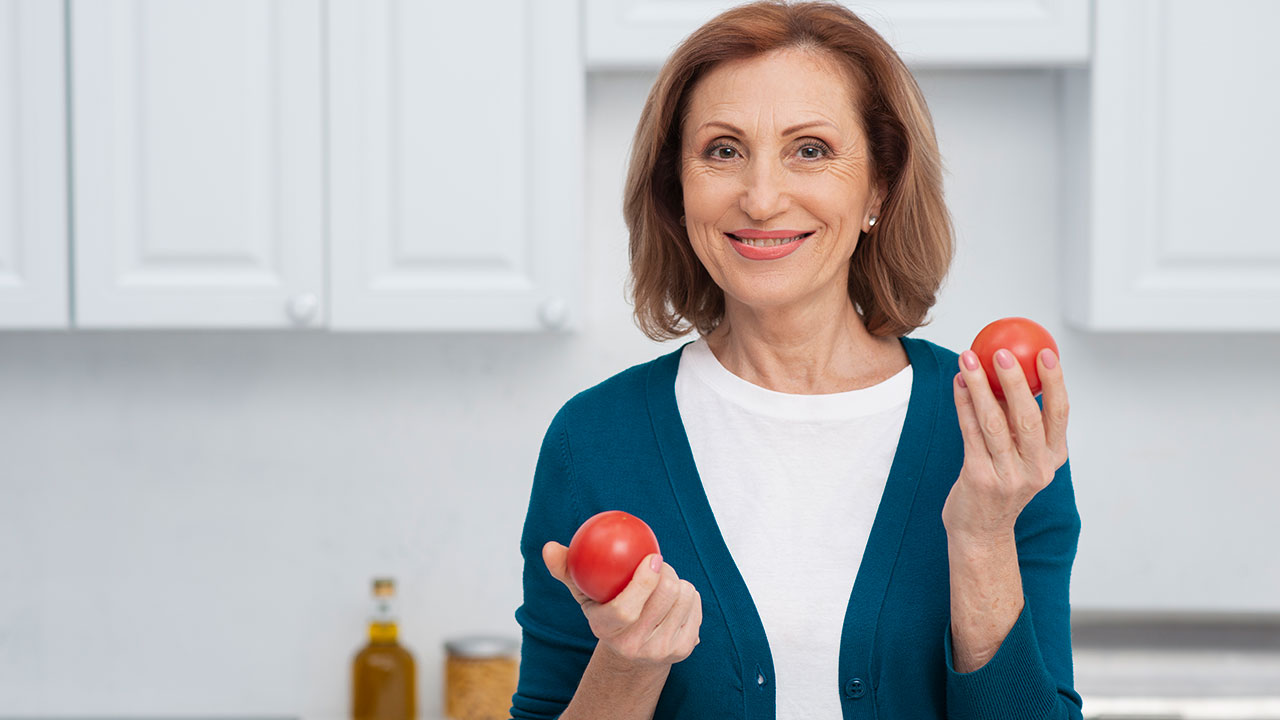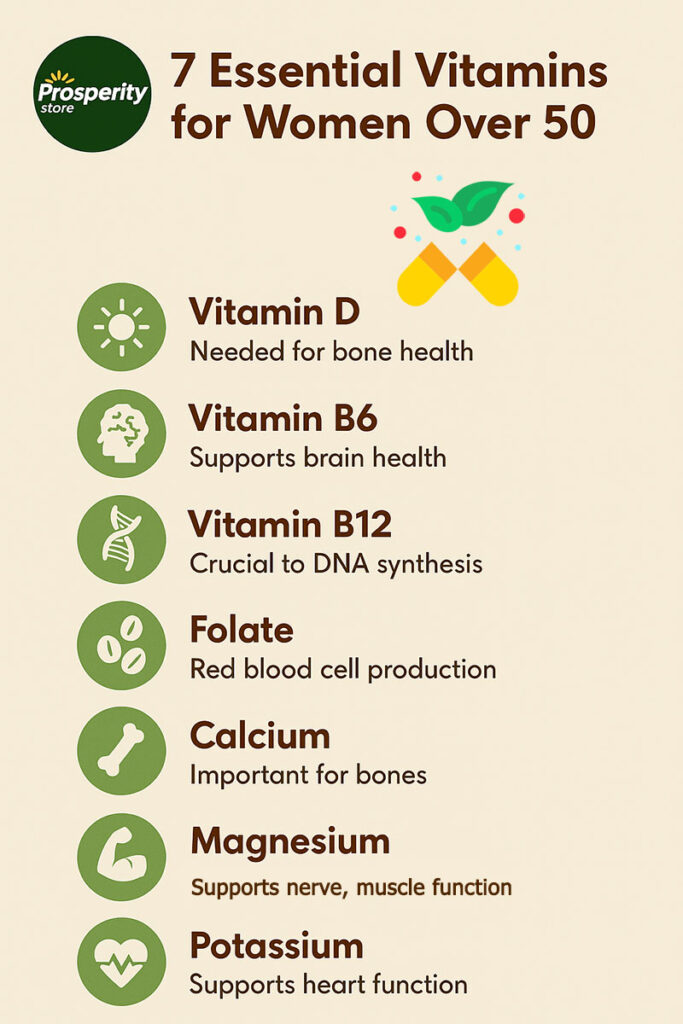7 Essential Vitamins for Women Over 50
Summarize

Understanding the changes your body undergoes due to aging allows you to take control of your health and make informed decisions. Aging alters the body’s ability to process nutrients, and most bodily systems slow down or function less efficiently. They include the metabolic system, the immune system, the blood pressure regulatory system, the nervous system, and the musculoskeletal system. Women also experience physical changes associated with menopause, like bone loss due to a decrease in estrogen. The essential nutrients for aging women are the vitamins and minerals that specifically target women’s physical needs.
Aging Women Face Health Risks
Supplements are not a substitute for a well-balanced diet and regular physical activity. They are a complement that can help you meet your body’s changing needs. Multivitamins usually contain vitamins, minerals, and amino acids. As women age, they need to rebalance their nutrient intake to accommodate the physical changes associated with aging and menopause. Once a woman experiences menopause, there is a higher risk of developing serious health issues. They include heart disease, osteoporosis, and stroke. Minimizing the risks is possible by exercising, eating a healthy diet, and taking dietary supplements.
Women experience menopause at different ages, with some experiencing it earlier than others. The average age is 52 years, but the transition period called perimenopause can begin several years earlier.
📜
Preparing for the changes in women’s health over 50 by taking a multivitamin specifically designed for women may help you avoid some of the common health issues aging women experience.
Multivitamins for Older Women
Specific essential vitamins and minerals play a crucial role in maintaining good health in women over 50 years old. They help minimize the risks of common health conditions, such as osteopenia, osteoarthritis, and heart disease. The following are seven of the best vitamins and minerals for women over 50.
Vitamins
The best vitamins for women over 50 address common health issues by supplying nutrients either missing from the diet or not efficiently processed in the body due to aging.

1. Vitamin D
Vitamin D is needed for bone health. It supports the building and maintenance of strong bones by enhancing calcium absorption and utilization. Vitamin D is also essential for important systems. They include the immune system, the nervous system, and the muscles. As you age, the body is not as efficient at converting the sun’s rays into vitamin D. Also, it is unlikely the diet is providing the necessary amount unless consuming foods fortified with vitamin D, like milk and cereal, and frequently consuming fatty fish, like salmon and mackerel.
The National Institute on Aging recommends that women aged 51-70 get a minimum of 15 mcg. This is equivalent to 600 IU of vitamin D per day. Women aged 70 years or older require a minimum of 20 mcg. At any age, vitamin D should be limited to a maximum of 100 mcg or 4,000 IU.
2. Vitamin B6
Vitamin B6 is involved in many of the body’s functions. They include the metabolism, nervous system, and immune system. This vitamin promotes brain health by enhancing the production of serotonin and dopamine, supports the formation of oxygen-carrying red blood cells, and is essential for producing antibodies and metabolizing nutrients. Women over 50 years need 1.5 mg per day.
3. Vitamin B12
Vitamin B12 contributes to bodily functions similar to vitamin B6 but is also crucial to DNA synthesis. It is released from proteins in foods like meat, fish, and dairy products by enzymes and hydrochloric acid in the stomach. B12 in a supplement is in a free form, meaning it is already in a released state. After the age of 50, stomach cells do not function as efficiently and may not secrete enough hydrochloric acid, which is necessary for absorbing B12 in the correct amount.
The recommended daily amount for women over 50 is 2.4 mcg. Vitamin B12 is better absorbed when you take it with other B vitamins and magnesium. This is one reason multivitamins for older women contain different B vitamins, including B6 and riboflavin.
4. Folate (B9)
Folate is essential for the production of RNA and DNA and red blood cell production. Folate contributes to the breakdown of homocysteine, an amino acid that may damage blood vessels. Women over 50 should get 400 mcg DFE daily.
Folate is important for women who can get pregnant or are pregnant, but even after menopause, women should continue to take folate. The body cannot store folate, and there are age-related changes to the ability to absorb folate.
Minerals
5. Сalcium
Women who are older than 50 are at risk of bone loss due to estrogen loss. Estrogen is crucial for bone growth, development, and bone turnover. This is especially true after menopause. Bone loss leads to osteopenia, a precursor to osteoporosis (T-score of -1 to -2.5), and osteoporosis, characterized by low bone density that makes the bones susceptible to breaking (T-score of -2.5 or lower). One of the best bone health supplements for women that may reduce the amount of bone loss and assist with bone building after menopause, women over 50 years old should take 1,200 mg of calcium daily.

6. Magnesium
Magnesium is a mineral that enhances calcium absorption for improved bone density. It supports muscle functioning, including contractions and relaxation, cardiovascular health, nerve transmission, blood pressure regulation and more. For women over 50 years old, the daily recommended dietary allowance is 320 mg.
7. Potassium
Potassium is another mineral that is involved in most of the body’s activities. They include heart function, kidney function, nerve transmission, and muscle contraction. When the body lacks sufficient potassium, blood pressure can increase, and calcium levels in the bones can become depleted. Another risk is that kidney stones may develop. Women over 50 years old require 2,600 mg of potassium daily.(14)
| Nutrient | Key Benefits | Recommended Daily Amount | Notes |
|---|---|---|---|
| Vitamin D | Bone health, immune and muscle support | 600 IU (15 mcg) for 51–70 y/o | 800 IU (20 mcg) for 70+ y/o; Max 4,000 IU (100 mcg) |
| Vitamin B6 | Brain function, red blood cells, immune support | 1.5 mg | Supports mood and metabolism |
| Vitamin B12 | Nerve health, DNA synthesis, red blood cells | 2.4 mcg | Absorption declines with age, supplements often needed |
| Folate (B9) | DNA/RNA synthesis, homocysteine breakdown, brain function | 400 mcg DFE | Important even after menopause |
| Calcium | Bone strength, reduces risk of osteopenia, osteoporosis | 1,200 mg | Especially important after menopause |
| Magnesium | Muscle, nerve function, bone density, blood pressure regulation | 320 mg | Also helps absorb calcium |
| Potassium | Heart, kidney, nerve function | 2,600 mg | Low levels can deplete calcium from bones |
Supplements for Menopause Support
Menopause can produce many symptoms. The vitamins and minerals mentioned not only support good health post-menopause. They can reduce symptoms during menopause, like cramping and hot flashes. There is some additional supplementation that may help a woman manage menopause symptoms.
For example, vitamin C supplementation may help minimize the effects of menopause, such as a reduction in diastolic blood pressure (the pressure of the blood against artery walls between heartbeats). It may also support cognitive functioning. Vitamin C is an antioxidant, and antioxidants protect against free radical formation. It is recommended that women consume 75 mg of vitamin C daily.
Zinc is a component of some enzymes and is essential to protein structures and gene regulation. The recommended daily amount for women is 8 mg per day.
Supplements for Immune Support
There are multivitamins designed to provide immune support for women. Some were mentioned: vitamin D, the B vitamins and vitamin C. Other crucial vitamins for immune support include vitamin A and vitamin E.
For women over 50, it is recommended to take 700 mcg of vitamin A daily. Vitamin A is a retinoid that supports immune function, cell growth, vision and more. Like vitamin C, vitamin E is an antioxidant. This means it inhibits the formation of free radicals. Women need 15 mg of vitamin E daily.
The Right Vitamins and Minerals for Daily Wellness
Incorporating the best vitamins for women over 50 into the daily health plan can significantly improve the quality of aging. As you body changes, especially during and after menopause, nutrient requirements change. Ideally, the necessary vitamins and minerals are obtained through a balanced diet; however, nutritional gaps often develop due to dietary deficiencies and the effects of aging. Taking supplements for menopause support and those that provide the necessary nutrients to maintain overall good health in the years to come is crucial for long-term quality of life. Before taking new supplements, consult your doctor to discuss the type and amount that can be taken safely.
The information provided in this article is for educational and informational purposes only and is not intended as medical advice. Always consult with your healthcare provider before starting any new supplement, especially if you have underlying health conditions.
Sources
- https://womenshealth.gov/menopause/menopause-and-your-health
- https://www.nia.nih.gov/health/menopause/what-menopause
- https://www.nia.nih.gov/health/vitamins-and-supplements/vitamins-and-minerals-older-adults
- https://medlineplus.gov/ency/article/002402.htm
- https://www.health.harvard.edu/staying-healthy/are-you-getting-enough-b12
- https://ods.od.nih.gov/factsheets/VitaminB12-Consumer/
- https://medlineplus.gov/ency/article/002403.htm
- https://ods.od.nih.gov/factsheets/Folate-Consumer/
- https://pmc.ncbi.nlm.nih.gov/articles/PMC1123448/
- https://pubmed.ncbi.nlm.nih.gov/8865143/
- https://www.ncbi.nlm.nih.gov/books/NBK499878/
- https://www.scirp.org/journal/paperinformation?paperid=66098
- https://ods.od.nih.gov/factsheets/Magnesium-HealthProfessional/
- https://ods.od.nih.gov/factsheets/Potassium-Consumer/
- https://pmc.ncbi.nlm.nih.gov/articles/PMC6372850/
- https://ods.od.nih.gov/factsheets/VitaminC-HealthProfessional/
- https://www.ncbi.nlm.nih.gov/books/NBK222317/
- https://ods.od.nih.gov/factsheets/VitaminA-HealthProfessional/#h8
- https://ods.od.nih.gov/factsheets/VitaminE-HealthProfessional/
Share this post
